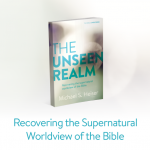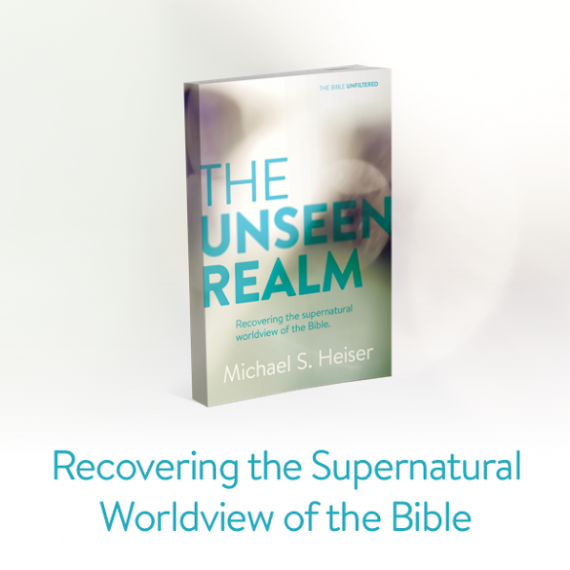Some people teach that 1 Corinthians 12:3 provides the test of a true Christian. I have also heard some people say that 1 Corinthians 12:3 can be used to help you know if someone is demon possessed. The verse says this:
Therefore I make known to you that no one speaking by the Spirit of God calls Jesus accursed, and no one can say that Jesus is Lord except by the Holy Spirit (1 Cor 12:3).

So what does 1 Corinthians 12:3 mean?
In 1 Corinthians 12:3 Paul makes two opposing statements which have led to much confusion among Christians.
Paul first says that nobody can say “Jesus is accursed (anathema)” when they are speaking by the Holy Spirit. He then states the opposing truth, that nobody can say “Jesus is Lord” unless they are speaking by the Holy Spirit.
Now, I just tried it, and I was able to say both statements as I read this verse out loud. Go ahead, you try it too. I bet you can verbally express both statements.
Similarly, I guarantee that if you ask an atheist or even a Satanist to say both statements, they will be able to say both as well.
So whatever Paul is actually saying, he cannot mean that only Christians are able to say “Jesus is Lord” but not say “Jesus is accursed” while those who are not true Christians can only say “Jesus is accursed” while being unable to utter the words “Jesus is Lord.”
Certainly the same thing was true in Paul’s day as it is in ours.
So 1 Corinthians 12:3 is definitely not a way to determine who is a Christian and who is not.
But what about demon possession?
Here too, it seems that there are times in the gospels where demons recognize and verbally stated the identity, power, and authority of Jesus Christ. There may not be any specific examples of demons saying “Jesus is Lord” but to say “Jesus is Lord” is to verbally recognize His power and authority, so to call Jesus “the holy one of Israel” or that Jesus is “the Son of God” (cf. Matt 8:28-29; Mark 1:24).
I wrote here about 1 John 4:2-3, which teaches a similar truth. No, Paul is not teaching in 1 Corinthians 12:3 about how to determine who is demon possessed.
So what did Paul mean when he wrote 1 Corinthians 12:3?
 The letter of 1 Corinthians is focused around some issues and questions that had arisen in the Corinthian church. When Paul sets out to address the other issues and questions, he begins with a short summary of what the issue or question was (cf. 1 Cor 7:1; 8:1; 16:1). Chapters 12–14 deal with the issue of spiritual gifts, and ultimately, the gift of speaking in tongues (1 Cor 14), and so 1 Corinthians 12:1-3 is apparently the opening summary statement of what issue or question the Corinthian Christians were facing.
The letter of 1 Corinthians is focused around some issues and questions that had arisen in the Corinthian church. When Paul sets out to address the other issues and questions, he begins with a short summary of what the issue or question was (cf. 1 Cor 7:1; 8:1; 16:1). Chapters 12–14 deal with the issue of spiritual gifts, and ultimately, the gift of speaking in tongues (1 Cor 14), and so 1 Corinthians 12:1-3 is apparently the opening summary statement of what issue or question the Corinthian Christians were facing.
Since this is so, 1 Corinthians 12:3 likely provides an indication of what some of the tongue-speakers were saying. It appears that some of these “super spiritual” leaders were speaking with ecstatic utterances and in the process, saying things like “Jesus is accursed.” When challenged about these words, they claimed that they were speaking by the Holy Spirit and could only say what the Spirit gave them to say.
Paul calls them out on this and says that if someone is speaking by the Holy Spirit, he will not say, “Jesus is accursed.” Instead, when someone is speaking by the Spirit, the Spirit will lead them to say “Jesus is Lord,” and other such things that edify the body of Christ and glorify the name of Jesus.
But why would people who are speaking in tongues say that Jesus is accursed?
So what is it that these “super spiritual” ones in Corinth were claiming when they stated that Jesus was accursed?
Were they claiming that Jesus was separated from God and was spending eternity in hell? This idea is doubtful, since the resurrection of Jesus and His glorification to the right hand of the Father pretty clearly refutes such an idea (Of course, some were arguing that there was no such thing as a resurrection. See 1 Cor 15:12).
No, what seems most likely in light of other uses of anathema in the Bible (See my Gospel Dictionary Course for explanation of these texts) is that certain Corinthian teachers were saying (while supposedly under the influence of the Holy Spirit) that the reason Jesus died is because He was suffering the consequences for sin, or for living in a sinful, human body.
The Corinthian Christians suffered from an early form of Gnosticism where they saw a deep separation between the physical and the spiritual worlds so that what happened in one did not affect the other. One related belief was the idea that the physical world was evil and the spiritual world was good. Therefore, if Jesus had a truly human body, then it must have been evil or sinful, and if so, then Jesus was accursed and died as a sinful human in the flesh so that God could set Him free into the spiritual realm.
 Paul spends much of his time in his letter arguing the exact opposite. In fact, this is partly why Paul goes on in 1 Corinthians 15 to argue about the physical resurrection of Jesus. Paul wanted to show that the physical world, and our physical bodies, were not inferior to the spiritual, but were partnered with the spiritual to accomplish God’s will in this world (John argues against similar beliefs in 1 John).
Paul spends much of his time in his letter arguing the exact opposite. In fact, this is partly why Paul goes on in 1 Corinthians 15 to argue about the physical resurrection of Jesus. Paul wanted to show that the physical world, and our physical bodies, were not inferior to the spiritual, but were partnered with the spiritual to accomplish God’s will in this world (John argues against similar beliefs in 1 John).
Jesus did have a physical body, and He was raised with a physical body, but this does not mean that He was sinful or accursed, as some of the teachers in Corinth were claiming. And even though they claimed to be “speaking by the Spirit” when they taught such things, Paul says that when people are speaking by the Holy Spirit, they will not say “Jesus is accursed” but rather, “Jesus is Lord.”
So 1 Corinthians 12:3 is not a litmus test for who is a Christian and who is not.
It is instead Paul’s introductory summary statement about some of the false ideas that various leaders in Corinth were teaching. It is also possible that the Corinthian leaders were saying such things in an attempt to explain Deuteronomy 21:23 (which Paul mentions in Galatians 3:13).
What do you think about 1 Corinthians 12:3 and the explanation above? Leave your comments below!
 Understanding the Gospel requires us to properly understand the key words and terms of the Gospel. Take my course, "The Gospel Dictionary" to learn about the 52 key words of the Gospel, and hundreds of Bible passages that use these words.
Understanding the Gospel requires us to properly understand the key words and terms of the Gospel. Take my course, "The Gospel Dictionary" to learn about the 52 key words of the Gospel, and hundreds of Bible passages that use these words.
This course costs $297, but when you join the Discipleship group, you can to take the entire course for free.








 Regarding this verse, Calvinists are not shy in stating their beliefs about what it teaches.
Regarding this verse, Calvinists are not shy in stating their beliefs about what it teaches. These three types of people reflect the three part of a person which we looked at in the
These three types of people reflect the three part of a person which we looked at in the 
 Furthermore, it could also be argued that when Paul says the natural man “does not” receive the things of the Spirit of God, “nor can he know them,” he is not referring to an inherent inability to do so, but rather to an antagonistic mindset that refuses to seek the truth and understand these things.
Furthermore, it could also be argued that when Paul says the natural man “does not” receive the things of the Spirit of God, “nor can he know them,” he is not referring to an inherent inability to do so, but rather to an antagonistic mindset that refuses to seek the truth and understand these things.